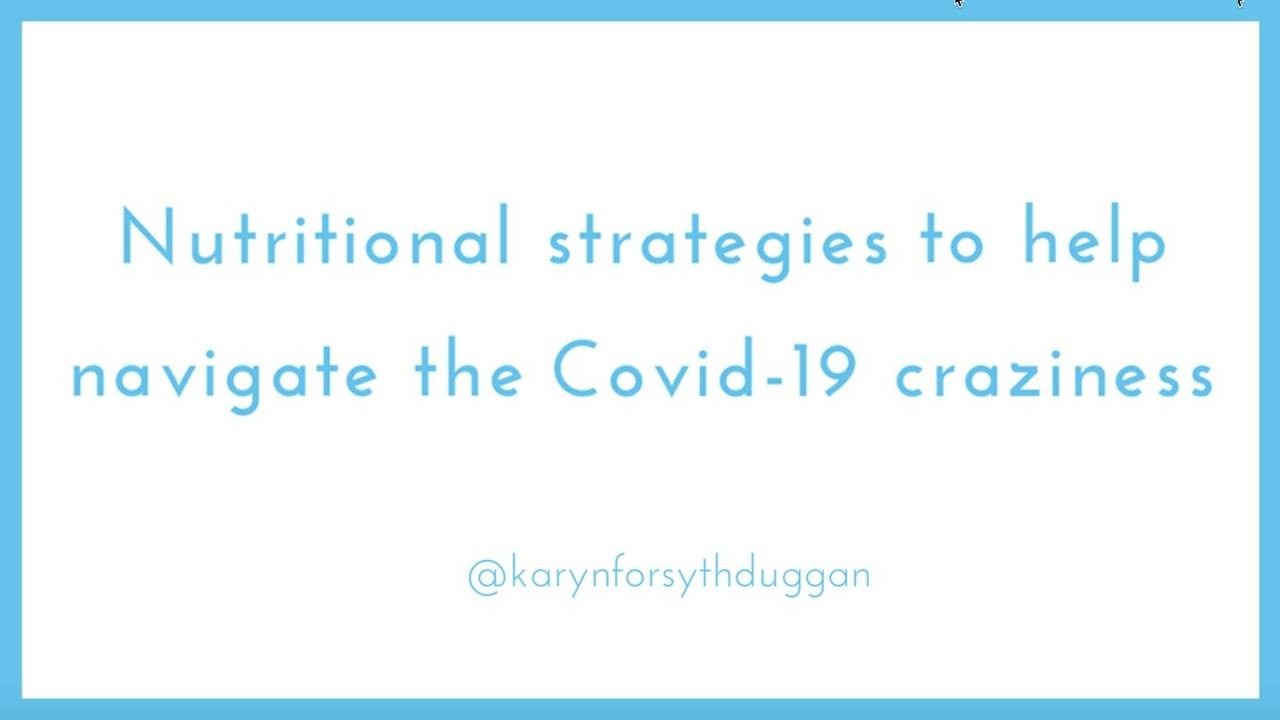Strategies for navigating Covid

I sincerely hope this message finds you, and your loved ones, healthy and well during this unprecedented time.
At this point, it's safe to say, you don't need any more reminders about the importance of washing your hands, practicing social isolation, prioritizing exercise and sleep so I'm not going to go there! However, I thought you might be interested in hearing my top 5 nutritional strategies to help support your immune system:
-
Remember food is information, i.e., your food choices literally program how you feel and function
Now is a perfect time for you to test this theory...here's how:
Tomorrow morning have cereal for breakfast (e.g., 1 serving of Cheerios w/milk), and keep track of how quickly you're hungry again afterwards, your energy level, and how you're feeling in general.
Then, the following morning make yourself either one of these breakfast suggestions (1) my keto version of a Spanish omelet OR (2) my 'farmer's market breakfast' (or something similar, i.e., a clean protein coupled with vegetables) and notice your subsequent hunger levels, how you're more energized etc. -
Fill at least half your plate with leafy & crunchy vegetables
The Institute for Functional Medicine (IFM) recommends we consume 9-13 servings of plant foods everyday, and the easiest way to do that is to include them every time you eat. FYI, a typical serving is 1/2 a cup of cooked vegetables, 1 cup of raw leafy vegetable, or a medium-sized piece of fruit. My guideline is to start by filling half your plate at lunch and dinner.
If you don't eat vegetables because you don't like them we should chat, because they can (and should) taste delicious. Remember plant foods are powerhouses of nutrition - for more specifics check this handout. -
Enhance the flavor of your food with potent antiviral, antibacterial, and anti-inflammatory spices such as garlic, ginger and turmeric
For suggestions about how to include these powerful natural medicines, consider any/all of the following recipes: Quick & easy curry (which can be made w/chicken/fish/chickpeas) OR Gremolata OR Andrew Weil's Umami sauce. -
Stay hydrated
I recommend consuming 1/2 your body weight in pounds in ounces, i.e., if you're 150 lbs you should aim to consume ~75oz of water everyday, ideally away from food (so you're not impeding the process of digestion). Note, I don't recommend you exceed ~100oz per day. -
Minimize your intake of sugar
Sadly, this Covid-19 pandemic could be surpassed by a pandemic of anxiety and depression. We all know that sugar can make you feel better for a moment or two (while you're consuming it), but almost immediately afterwards you're left wanting more, and research confirms the adverse effects of sugar on psychological health. The World Health Organization (WHO) recommends daily sugar intake should be < 36g (9 tsp) for men and < 28g (7 tsp) for women, but most of my clients far exceed these amounts when we start working together. Click here for more information about how to interpret sugars on a label.
So, I recommend getting creative in the kitchen, but don't go bananas baking! If you really want to bake, and/or if baking helps ease your stress levels, then consider baking a healthy bread instead of baking a cake/something sweet.
The bottom line is that this time too will pass, which reminds me of an older TED talk (from '11, but it's still a good one, and it's quick - it's < 4 minutes) by Matt Cutts entitled 'Try something new for 30 days' so, consider this a time to set yourself a challenge. LMK if you need help, and/or just LMK how you get on - I'd love to hear.
Stay healthy and well.
Best,
Karyn
References:
Knuppel, A., Shipley, M. J., Llewellyn, C. H. & Brunner, E. J. (2017). Sugar intake from sweet food and beverages, common mental disorder and depression: prospective findings from the Whitehall II study. Scientific Reports, 7, 6287. doi: 10.1038/s41598-017-05649-7
Vermeulen, E., et al. (2017). A combined high-sugar and high-saturated fat dietary pattern is associated with more depressive symptoms in a multi-ethnic population: the HELIUS (Healthy Life in an Urban Setting) study. Public Health Nutrition, 20(13), 2374-2382. doi: 10.1017/S1368980017001550

